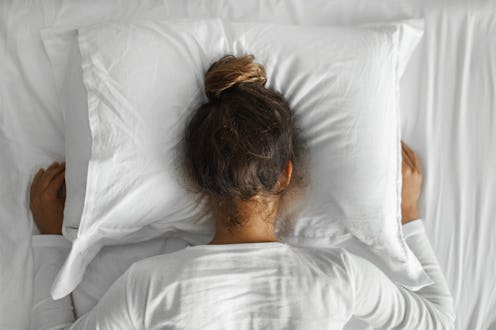
When we think about our mental health, it can be really fascinating to consider the ways outside factors, such as our environment, can impact our moods and stability. For example, given that the time to change our clocks back is rapidly approaching, I've been wondering: How does Daylight Saving Time affect your mental health? As we all already know, we adjust our clocks to account for DST twice a year: Once in the spring (spring ahead), and once in the fall (fall back). But how do these shifts in time impact our mental state?
In 2016, we "fall back" on Nov. 6. Although most of us probably collectively groaned when we lost an hour of sleep in March, we'll likely be groggily rejoicing when we gain it back in November. But aside from our clocks changing, DST also has a pretty interesting impact on our health. It's not too surprising to learn that the amount of sleep we get can affect our physical health, but it's definitely worth exploring the fact that DTS may affect our mental health, as well.
A lot of it has to do with how much sunlight we're getting (or aren't getting, as the case may be), but there's also a little more to it than that. Here are four things you might experience when we turn the clocks back in a few weeks:
You May Be More Likely To Suffer From SAD
Given that it's officially autumn now, it's important to point out that for people who suffer from Seasonal Affective Disorder (SAD), the shift in time resulting from from DST is no small matter. "Falling back" in time coincides with the shorter days we experience in the fall and winter, meaning that we have less time exposed to the natural light. (Just think: How many times during the colder months have you woken up and gone to work before the sun came up, worked in an enclosed space all day, and then not headed home until after the sun has set again?)
Sleep expert Teofilo L. Lee-Chiong, MD explains at Greatist that it's helpful for people who suffer from SAD to preemptively counteract the effects of lost sunlight with artificial light therapy. While SAD is pretty serious to deal with it, DTS at least always comes on a predictable cycle, so you can work to nip possible effects in the bud ahead of time.
You Might Feel More Irritable
Given that our sleep schedules shift with DTS, it's pretty normal to experience more irritability until your body adjusts. For example, as Dr. Charles Czeisler, chief of sleep medicine at Brigham and Women's Hospital, explained to CBS News, "We know from small studies that in people who are sleep deprived, the amygdala, which is the emotional center of the brain, is much more reactive to disturbing images as compared to somebody who's well rested."
Basically, this means that if you find yourself feeling short-tempered with your coworkers or family, DST may be a possible cause; it usually makes your sleep schedule go out of whack for a short while. Give yourself a little time to cool down and put it into perspective.
You Might Lose Motivation At Work
Ever go into work and find yourself spending extra time on Facebook and YouTube when still adjusting to DST? You're definitely not alone if so. According to a 2012 study published in the Journal of Applied Psychology, many employees who had shifts affected by DST had an increase in "cyberfloating" — aka, wasting time on the Internet instead of working. Luckily, this loss of work-related motivation should even out when you adjust to your new schedule.
You May Feel More Anxious
Research from Tel Aviv University suggests that when your sleep schedule is disrupted, you may feel more anxious and more likely to have emotional outbursts. This makes a lot of sense no matter the season, because either way, your sleep schedule is still being affected.
Images: Oleg Breslavtsev/Moment/Getty Images; Giphy (4)